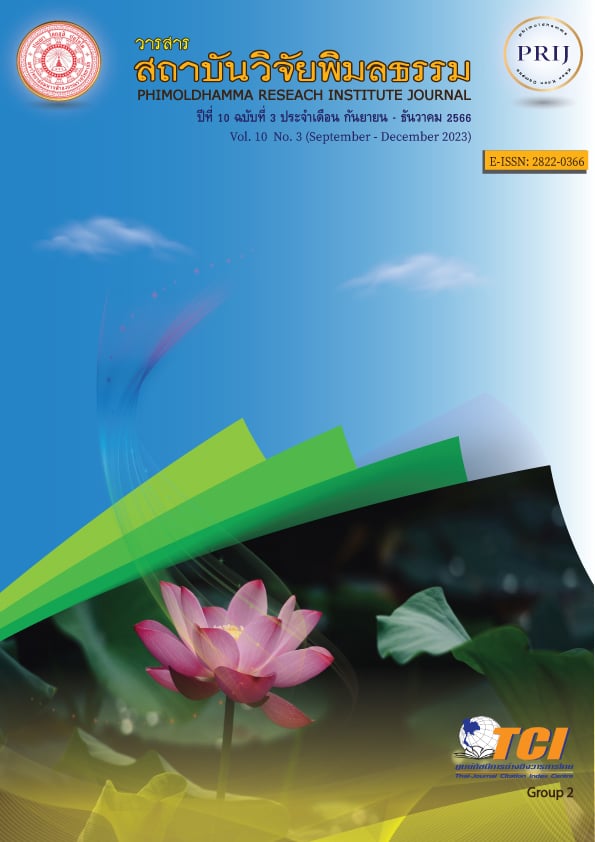รูปแบบการพัฒนาทักษะการบริหารตามหลักกัลยาณมิตรธรรมของผู้บริหารโรงเรียนพระปริยัติธรรม แผนกสามัญศึกษา เขต 8
คำสำคัญ:
ทักษะการบริหาร, โรงเรียนพระปริยัติธรรม, หลักกัลยาณมิตรธรรมบทคัดย่อ
การวิจัยครั้งนี้ มีวัตถุประสงค์เพื่อ 1) ศึกษาสภาพปัจจุบัน สภาพพึงประสงค์และความต้องการจำเป็นการพัฒนาทักษะการบริหาร 2) สร้างรูปแบบการพัฒนาทักษะการบริหารตามหลักกัลยาณมิตร และ 3) ประเมินรูปแบบการพัฒนาทักษะการบริหารตามหลักกัลยาณมิตรธรรมของผู้บริหารโรงเรียนพระปริยัติธรรม แผนกสามัญศึกษา เขต 8 การวิจัยครั้งนี้มีการดำเนินการเป็น 3 ระยะ ได้แก่ ระยะที่ 1 ศึกษาสภาพปัจจุบัน และสภาพที่พึงประสงค์และความต้องการจำเป็นของการพัฒนาทักษะผู้บริหารตามหลักกัลยาณมิตรธรรม กลุ่มตัวอย่าง ได้แก่ ผู้บริหาร ครูโรงเรียนพระปริยัติธรรม แผนกสามัญศึกษา เขต 8 จํานวน 201 รูป/คน เครื่องมือที่ใช้เป็นแบบสอบถามแบบมาตรประมาณค่า 5 ระดับ เกี่ยวกับสภาพปัจจุบันและและสภาพที่พึงประสงค์ โดยความเชื่อมั่นของเท่ากับ 0.856 และ 0.872 ตามลำดับ วิเคราะห์ข้อมูลโดยหาค่าเฉลี่ย ส่วนเบี่ยงเบนมาตรฐาน และ PNI modified ระยะที่ 2 การพัฒนารูปแบบการพัฒนาทักษะการบริหารตามหลักกัลยาณมิตร กลุ่มผู้ให้ข้อมูลสำคัญได้แก่ ผู้ทรงคุณวุฒิ จํานวน 15 รูป/คน เครื่องมือที่ใช้เป็นแบบสัมภาษณ์แบบกึ่งโครงสร้าง วิเคราะห์ข้อมูลโดยใช้การวิเคราะห์เชิงเนื้อหา และระยะที่ 3 การประเมินรูปแบบฯ กลุ่มตัวอย่างได้แก่ผู้ทรงคุณวุฒิ จํานวน 10 รูป/คน เป็นการประเมิน ความถูกต้อง ความเหมาะสม และความเป็นประโยชน์ วิเคราะห์ข้อมูล โดยหาค่าเฉลี่ยและส่วนเบี่ยงเบนมาตรฐาน
ผลการวิจัยพบว่า
1. ความต้องการจำเป็นของการพัฒนาทักษะทางการบริหาร เรียงลำดับได้ดังนี้ 1) ทักษะด้านเทคนิค 2) ทักษะด้านการบริหารเวลา 3) ทักษะด้านความสัมพันธ์ระหว่างบุคคล 4) ทักษะด้านการวินิจฉัย 5) ทักษะด้านการตัดสินใจ 6) ทักษะด้านการสื่อสาร และ 7) ทักษะด้านมโนภาพ
2. รูปแบบการพัฒนาทักษะการบริหารตามหลักกัลยาณมิตรธรรมของผู้บริหาร โรงเรียนพระปริยัติธรรม มีองค์ประกอบ คือ หลักการและแนวคิด วัตถุประสงค์ เนื้อหาและผลลัพธ์ที่คาดหวัง โดยเรียงลำดับการพัฒนาตามลำดับความต้องการ
3. รูปแบบการพัฒนาทักษะการบริหารตามหลักกัลยาณมิตรธรรมของผู้บริหาร โรงเรียนพระปริยัติธรรม มีความเหมาะสม ความเป็นไปได้ และความเป็นประโยชน์ในระดับมากที่สุด
เอกสารอ้างอิง
ปรียาพร วงศ์อนุตรโรจน์. (2546). การบริหารงานวิชาการ. กรุงเทพฯ: สหมิตรออฟเซ็ท.
แพรดาว สนองผัน และเสาวนี สิริสุขศิลป์. (2557). ทักษะของผู้บริหารสถานศึกษาในศตวรรษที่ 21 สังกัดสํานักงานเขตพื้นที่การศึกษาประถมศึกษาอุดรธานี เขต 3. (รายงานการวิจัย). ขอนแก่น: คณะศึกษาศาสตร์ มหาวิทยาลัยขอนแก่น.
ภูวดล จุลสุคนธ์. (2557). ทักษะในการบริหารงานของผู้บริหารสถานศึกษาตามทัศนะของผู้บริหารและครู สังกัดสำนักงานเขตพื้นที่การศึกษาประถมศึกษาสระบุรี. ลพบุรี: มหาวิทยาลัยราชภัฏเทพสตรี.
สำนักงานพระพุทธศาสนาแห่งชาติ. (2557). คู่มือปฏิบัติงานเกี่ยวกฎหมาย กฎ ระเบียบ ประกาศ และคำสั่งที่เกี่ยวกับโรงเรียนพระปริยัติธรรม แผนกสามัญศึกษา. กรุงเทพฯ: สำนักงานพระพุทธศาสนาแห่งชาติ.
Kindred, L. W. (1975). School Public Relations. Englewood Cliffs. New Jersey: Prentice-Hall.
Mostafa, A., et al. (2012). Prioritizing Managerial Skills Based on Katz’s Theory in Physical Education Offices of Universities in Iran. World Applied Sciences Journal, 20(3), 388-394.
Ricky, W. G. (2013). Management Principles and Practices. Canada: Nelson Education.






